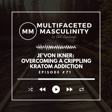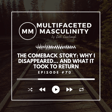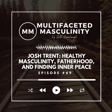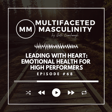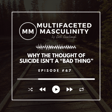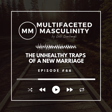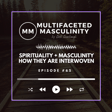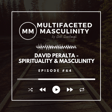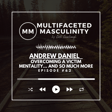Become a Creator today!Start creating today - Share your story with the world!
Start for free
00:00:00
00:00:01

5 Ways to Prevent Burnout During Major Life Transitions | Ep #53
As a former Marine with an all-or-nothing personality, sometimes I feel as if I’m hardwired for burnout. I have to be proactive and go out of my way to take action on a few practical steps to keep me in a healthy place. Today we’re diving into what those action items are and how you can use them to navigate especially stressful or disruptive times in your life.
In this episode you'll learn:
- 5 practical things you can (and should) do on a regular basis when you’re going through a major transition.
- What the hell a “micro-resets moment” is, and why they are important.
- How to fight the tendency to feel overwhelmed
- How to stay emotionally grounded and present when fight or flight kicks in.
Host: Josh Cearbaugh
https://www.linkedin.com/in/joshcearbaugh/
https://www.jumpstartyourlife.com
Transcript
Introduction to Managing Life Transitions
00:00:00
Speaker
Today I'm gonna slap myself on the hand, something that is long overdue, metaphorically. Today's podcast is both for you hopefully to gain and glean some good ideas of what to do when you're in transition, but also a much needed reminder for me of what I need to be doing through my own transition.
00:00:26
Speaker
I've been going through a lot and we're going to get into that in the episode here in just a little bit. But sometimes we just need to be reminded of really important, might seem easy, but really important things that you need to and can do when you're going through some kind of a major stress or transition in life.
00:00:47
Speaker
in order to be able to move you through that transition or help you manage that stress in a way that you don't find yourself just emotionally exhausted and burnt out on the other side. If you haven't already, please take a moment to subscribe. As always, I love
Listener Engagement and Feedback
00:01:04
Speaker
feedback. I want this conversation to extend beyond the podcast, so give me feedback whether that's
00:01:10
Speaker
in reviews or shoot me an email as to if you have any other ideas that you have found that's really helpful. And without further ado, let's dive into a few ways that you can help prevent burnout when you're going through really stressful times or major life transitions.
00:01:27
Speaker
Men, we are not simple, chest-thumping, rock-smashing, fire-starting barbarians. We have depth. We intensely feel. We are scared, yet brave. We love to have fun. We're imperfect and make mistakes. We're compassionate and loving. We are multifaceted. Let's explore the reality of masculinity together.
00:01:56
Speaker
All right, today is more so for me than it is for you, to be honest. I needed a reminder of how to manage myself in a healthy way. And I thought, what's a better way to do that than to force myself and sit down and think about a podcast episode to help really navigate some of the key things that I need to be doing and have been incorporating
00:02:21
Speaker
during my own transition.
Personal Challenges with Transitions
00:02:23
Speaker
Just this week my partner and I we closed on six and a half acres about 35 minutes south of Austin and we're going to be starting our homestead journey. There's more to that to come but
00:02:36
Speaker
It's been stressful. I've had to move out of my home and now we're living in her two bedroom townhouse, sometimes with five children. And because there's been some interim within the closing date and we're moving twice and it's just, it's one of those major stressors in life. In case you don't know what the five major stressors are, it's either death of a loved one or divorce.
00:03:02
Speaker
Moving which is you know, we're firing one of those any kind of a major illness or injury in life or a job loss or career change and I would even throw in there a sixth one that is having children as Beautiful and lovely and fulfilling and life-changing as it is. It's also very very disruptive in a major stressor. So today we're diving into some what are the what are some of the
00:03:28
Speaker
core things that you can and should be doing to really prevent burning yourself out during those stressors or like I like to call them as transitions. They're major transitions in your life.
00:03:42
Speaker
And those transitions, even if they're good, they could be bad, like a loss of a loved one or divorce, but they could be really good. They could be moving onto land, which is a dream of mine and has been a dream of mine for years. Or it could be moving across the country because you're one of the evacuees from California to Texas or whatever it may be.
00:04:04
Speaker
It could be some really positive changes that doesn't take away the fact that they're really stressful and they require more of you. And the last thing that you want or need is to let that stress or that tension in that transition suck the life out of you in a way that causes you to
00:04:26
Speaker
come into that next season, that transition burnt out, whether that be emotionally, spiritually, physically, mentally. You want to do transition in a way that lets you hit the ground running metaphorically, where on that other side of the transition, yes it's stressful, but you've moved through it in a way that you've maintained an internal ballast and a grounding
00:04:49
Speaker
where you're not short with your spouse or yelling at your kids or spiraling down into a shame or depression spiral. And I'm not saying that you're not going to, if you have a death of a loved one, that you're not gonna have depression that's associated with the stages of grief. Not at all. I'm talking about burning yourself out to the point where you don't have that sustained capacity of growth
00:05:15
Speaker
that all of us deep down inside desire to be able to have. And so some of the things that I've been doing, I just thought I would pass along as well as like I said, challenge myself to continue to do one, I would say selfish benefit of this podcast
00:05:34
Speaker
is that when I grab a topic and I kind of dive into it or dissect it or break it down, a lot of times it's a friendly reminder of going, oh shit, you know what? I haven't been doing X, Y, or Z and I really need to be doing X, Y, or Z if I'm talking about it. I don't pretend for a second to be the guru who has all the answers. And so I love these episodes that are good reminders for me and hopefully they're good reminders for you as well.
Stress Management Strategies
00:06:04
Speaker
The first one, we're going to dive into just five quick points today of managing yourself in a way that you don't find yourself burnt out on the other side of transition. And the first one, I'm actually going to be stealing from my younger brother who has been featured or mentioned on this podcast over the years. We are definitely close with one another and iron sharpens iron and we love to challenge and encourage one another.
00:06:31
Speaker
And he said something a couple of weeks ago that was really, it hit home for me because one of the areas of burnout, it comes from this just feeling like you're in this consistent white noise of overwhelm where there's so much to do, whether it's let's just use move because that's what I was doing.
00:06:50
Speaker
organizing your stuff and going through your stuff and canceling your utilities and changing your address on all your cards and managing your kids and making sure they're fed and to school or to summer camp or whatever it may be and maintaining connection with your loved one and like all of that gets lumped into a blender and it's really easy to just find yourself feeling overwhelmed.
00:07:14
Speaker
And my brother asked, related to his process, he said, well, what's the next best step that I can take right now? And I think that's really important to focus on and hold on to. You can do really practical things like using a task management, either app or to-do list or a whiteboard, whatever you use to manage all of the really practical things.
00:07:38
Speaker
And I find it really helpful even to take those tasks and prioritize them in a way that makes that next best step really clear and easy to understand because the greatest inoculate to overwhelm is action. And sometimes when you don't have that question kind of at the forefront for you is what's the next best step that I can take?
00:08:01
Speaker
then at least in my life and for me, when I feel that sense of overwhelm, then it makes me want to run to those unhealthy norms that I used to gravitate to in the sense of avoidance or checking out or not doing the proactive things that I need to do to keep the ball moving forward.
00:08:21
Speaker
when you take it and you say, what's the next best step that I can take? You remove that overwhelm from that giant to do list and you go, okay, I'm going to look at my list or I'm going to think about where I'm at. And what, what is that next best step that I can take? And you begin to do that one and you go, okay, well, I did that one now. What's the next best step that I can take?
00:08:42
Speaker
And if you just use that as a mantra when you're going through transition, it helps you chisel away at that sense of overwhelm that's so easy to set in and it keeps you from
00:08:55
Speaker
feeling trapped or smothered by the transition. And regardless of how you slice it, all those things have to get done anyways. And we all know the more that you kick the can down the road and put things off, the only the worst it's going to get. So if you can continue to focus on what's that next best step that you can take, it really helps you
00:09:19
Speaker
Tangibly practically move through your to-dos and move through that transition But also it helps you in this even applies to grief right or a major illness maybe that next best step that you can take is not get on not sit on the couch all day and literally just go for a walk because you've had a knee injury for years and
00:09:40
Speaker
you've let that become stagnant and so that's been very disruptive and it's not dismissing the challenge of that but what's the next best step that you can take to work through that or going through a divorce you know maybe it's really practically reaching out to your attorney and having this conversation or closing this account it's just keeping that in front of you what's the next best step that i can take so that's point one number two and i have to say probably out of everything i have in my list this one
The Role of Self-Care and Sleep
00:10:09
Speaker
Even though I know it's probably one of the most important, it's also the easiest for me to let go of or lower its priority. And that is to make sure that you make self-care a priority, even if and especially when it's inconvenient.
00:10:30
Speaker
So two days ago, I blocked out an afternoon. I've got plenty of going on. I've got two businesses. I've got this podcast. I'm moving twice in a month. We're blending family. I mean, there's so much going on, but I blocked off an afternoon and I got a massage and then I did contrast therapy where it's you oscillate between sitting in a really hot infrared sauna and then doing a cold plunge in really cold water.
00:11:00
Speaker
And I just took that afternoon to myself because I needed some time to rejuvenate, to recharge, to kind of unplug and pull out of the tornado of the transition that I find myself in. And today I went and I did yoga, and that's one of my personal practices that I do for self-care. And it's so easy for you to lower the priority of self-care when you feel like there's so much to be done.
00:11:30
Speaker
But what happens is when you don't make that self-care a priority, you slowly begin to lose your capacity to sustain the momentum and the growth and it's a domino effect, right? It's the toilet bowl syndrome I like to call it because then when you don't make for me, let's say yoga a priority, then I don't feel quite as physically on it or I'm not firing on all cylinders, which then,
00:11:54
Speaker
makes it easier for me to not want to eat quite as healthy, which then makes me want to snack late at night, which then disrupts my sleep, which then causes problems in the way that I have a shorter fuse with frustrations with calling into the cell phone company, whatever it may be. But my point is, if you lower that priority of self-care,
00:12:19
Speaker
then you're starting that toilet bowl syndrome process where you are slowly letting those dominoes fall. And you may say, you know what, I love going for a bike ride, or you know what, I love going to,
00:12:33
Speaker
any kind of a gym for a workout program, whatever it is, you have to set it as a priority, especially and even if it's inconvenient because making it a priority is actually going to allow you to be able to focus on those next best steps or work through some of these other things that we're talking about and really be able to stay grounded.
00:12:56
Speaker
it's when you throw self-care to the wayside and you say, you know what, I just got to get this stuff done and this other stuff doesn't really matter, this other stuff being the things that I know that I need to do that help me feel recharged and fulfilled and grounded, then it may work for a period of time. And I'm not opposed to doing sprints, but you can't sprint a marathon, right? So it may be, for me, the weekend of my move
00:13:23
Speaker
or the week of my move, I'm going, you know what? It's literally not practical. I have to load the boxes, get the U-Haul, transition this over, unpack it, tear down the boxes. I'm not gonna go to yoga for four or five days because I just can't. I'm in this sprint of a move.
00:13:40
Speaker
But the month leading up, and I'm going to give myself 10 days or two weeks around it to not go to yoga, but then I have to get back at it. I have to make sure that I continue to make that a priority and keep that at the forefront so that I don't burn myself out through this transition. And speaking of burnout, point three, guard your sleep. I couldn't stress this enough.
00:14:10
Speaker
Guarding your sleep is equivalent to guarding your children or guarding the things that matter most to you because sleep is one of the cornerstones that allows you to be able to sustain the pressure that, you know, you're in that pressure cooker of transition. Well, even more so than the self care point, the sleep,
00:14:39
Speaker
you wanna talk about an accelerant for the toilet bowl syndrome. If I don't get good sleep, it doesn't mean that I'm not gonna, you know, I'm gonna get 10 hours of sleep every single night. It may be that you only need five or six or seven. Now there are sides of the argument that say that that's not good for you, but I know people that sustained for 20, 30 years that really only need six and that's kind of their sweet spot.
00:15:02
Speaker
If you know what that is for you, then you need to protect those parameters. You need to do what you need to do in the sense of,
00:15:10
Speaker
not watch tv or get off your phone or set reminders late in the evening read books do the things that that actually set you up for success with solid sleep at night and then make sure you know for me it's right around that seven a half seven and a half hour mark is kind of my sweet spot i can get seven hours i can get eight hours but if i get below seven hours okay for a night or two that's fine i can bounce back
00:15:36
Speaker
But I'm not 18. I mean when I was in the Marines we would do these five-day war simulations where you'd get three hours of sleep a night and then you'd get three or four or five 15-minute power naps and you just kind of did it and then when you were done with that then you'd sleep for 14 hours and keep going. Well I was 18. I was 19. I'm 40 now so my my ability to just bounce back from that is not nearly what it used to be.
00:16:02
Speaker
And it's really like throwing fuel in that toilet bowl syndrome, like I said, because when I don't sleep good, then I don't wanna get out of bed, then I don't wanna do my morning routine, then I don't do my self care, then I don't tackle the tasks, then I feel overwhelmed. All of those things are, really the sleep is what catalyzes the downward spiral of that.
00:16:26
Speaker
And none of this is a make or break, right? But the goal, like I said, the goal is that you don't arrive on the other side of these transitions, these major life disruptors, these major life stressors where you're just completely at the end of yourself. Now, fourth one is set aside what I like to call micro reset moments.
00:16:51
Speaker
And these are just really simple throughout the day. You can set a reminder, you can integrate it into your daily routine, even outside of transition. This is still good to do, but especially through transitions or major life disruptions.
00:17:07
Speaker
The micro reset moments, you can download an app and have a five minute meditation or even if you have an Apple watch, I know they have the breath work where you can set a reminder to do one, two, three, four, five minutes of breath work that it vibrates and kind of helps you pace your breath work or box breathing.
00:17:28
Speaker
or going outside, taking off your shoes and socks and doing a few minutes of grounding, or taking a slightly longer shower than you need to, or setting aside time for that breath work. Just whatever it is for you that you need to do to just kind of reset throughout the day, one, two, three, four times,
00:17:50
Speaker
It's so easy when you're in transition or you're in something that's majorly disruptive to get sucked into the chaos of all of that and the way that you stay clear and the way that you don't burn out is You find moments throughout that transition throughout the day and each throughout throughout the day each week where you are doing these little micro resets, maybe it's
00:18:16
Speaker
every day instead of, see I'm a big proponent of journaling and normally I do journaling in the morning. Well, through transition it may be that I just crack open my journal and I write two or three or five sentences during my lunch break or during the time that I sit down to eat.
00:18:34
Speaker
It's not going to look the exact same because you've got a lot going on. There's it's emotionally draining. There's a lot of practical things that need to be taken care of. So I'm not saying it has to look perfect, but it's important to set aside these times for micro resets where
00:18:51
Speaker
you are unplugging from the process of the transition and it really what it does is it enables you to instead of be the participant in the chaos to just pull aside a moment or two and reset.
00:19:07
Speaker
to become the observer, to reground, to reconnect to your strength. And doing that, you may think, you know what, five minute meditation, one, I don't have time for it, two, it's a waste of time.
00:19:22
Speaker
Well, if that's your thought or your opinion, why don't you download an app and try a five minute meditation? My guess is that it's going to be harder than you think it is. And it's only five minutes, right? And if you're saying, I don't have five minutes to set aside to slow down, then you're in a worse place than you may realize. I'm not saying that meditation is the end all be all solution for everything. I'm just saying that's a great starting point.
00:19:45
Speaker
If you can't set aside five minutes for two or three times throughout the day, or even once a week throughout the day in the middle of the day to just hit pause and reset,
00:19:55
Speaker
or to take three minutes to do some breath work, then it's a great indicator that you are wrapped up in your transition, that you are letting that stress overwhelm you to the degree that you feel like a, to a degree, you're a victim to your circumstances instead of being the proactive owner of your own destiny. And so setting aside these micro reset moments is really important, especially when you're going through transition.
Community Support and Key Takeaways
00:20:24
Speaker
And lastly, it's to stay connected to community. I know some of these major stressors in life, especially death of a loved one or divorce or these major illnesses, things like that, it's so easy to withdraw, right? Whether that be grief or pain or disappointment.
00:20:46
Speaker
It's so easy to withdraw from community and from people because you just don't feel like it. You just don't feel like you have the capacity or the desire or the push to be able to be connected or you're quote unquote too busy. I don't know how many of you know someone who is always saying, well, I'd love to connect, but I'm just too busy. A lot of the people that are too busy to connect either one don't really care about the relationship enough to make it intentional.
00:21:14
Speaker
and two are often hiding behind too busy. So they stay busy enough so they don't actually feel what they're actually needing to feel inside.
00:21:24
Speaker
But that's a different tangent for a different day for today. The way that it helps you prevent burnout is that community. If you don't let community rally around you at the time that you need it most, even if you feel like you don't, then you're, it's another one of those ingredients that leads to that sense of overwhelm or burnout.
00:21:48
Speaker
You know, I, in this moving process, reaching out to community, this is another one that's hard for me. You know, I'm a former Marine, I'm somewhat stubborn. I feel like I can get things done and I can, I pride myself in my ability to push through and challenge myself and continue and press on. But like I said, I'm not 18 anymore.
00:22:09
Speaker
I needed more help moving than normal. And especially through the transition with Christianity and the church and my community through the divorce, all of that has evolved and changed. And so it felt really awkward or uncomfortable for me to reach out to some of my friends who I actually haven't talked to in a couple months for some of them and say, hey, what are you doing next week? Do you want to help?
00:22:34
Speaker
But doing that created an opportunity for a few things. One, for some of them to show up and show that they actually still did want to maintain connection and friendship and they did want to help and let me swallow my pride and get my ego out of the way.
00:22:52
Speaker
and accept their help and reconnect with them and continue to build that community. It helped me not feel overwhelmed like I had to do it all on my own. It helped save my back from having to lift a bunch of shit that I probably shouldn't have on my own. And so staying and whether that's going back to those major stressors, maybe you're processing grief of loss of a loved one. Well, you need that community to rally around you and let them love you in your grief.
00:23:20
Speaker
or loss of a job or career. I don't know about you, but some of the biggest areas where ego and pride can get in the way is in finances and let some friends buy you groceries or to fill up your gas, which is.
00:23:33
Speaker
ever increasing by the cost per gallon now. Or to, you know, it's really easy if you have children when they're first born, set up a meal train with community, but what does that look like three months, six months down the road? Do you still let community support you? Or do you just begin to isolate and try to do it on your own? So just to summarize really quickly is, one, ask yourself, what's the next best step that I can take?
00:24:02
Speaker
two I would say two and three making self-care and sleep an absolute priority even if and especially if it's inconvenient because that's what it's going to guard you from starting that toilet bowl syndrome setting aside micro reset moments where throughout the day or throughout the week you just pause and unplug and reground and reconnect and for yourself
00:24:27
Speaker
And lastly is to not do it on your own. We are not meant to go through some of the most stressful, hardest challenges of our life on our own. We're not hardwired for that. We're hardwired for connection and for community. And even if it feels uncomfortable,
00:24:44
Speaker
or it's the last thing that you wanna do, letting community be part of your stress, part of your to carry some of that burden, to be there to lift practical things, but emotionally to lift you up as well.
00:24:58
Speaker
that is going to strengthen those relationships and deepen those relationships and help you arrive on the other side of that transition without feeling burnt out or feeling less burnt out and being able to find yourself on the other side of that transition with the desire and the capacity to continue to build and build on that transition or transition through that grief and begin to rebuild your life.
